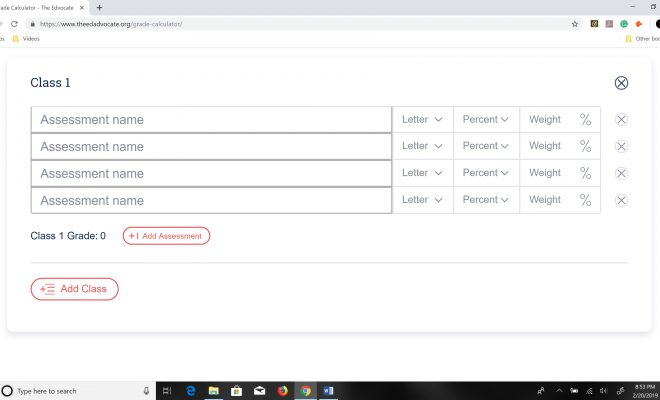How to Calculate Your High School and College Grades

Thinking back on my K-12 and college years, I remember hearing my parents say “keep your grades up.” If it weren’t for good grades, I might not be where I am, on the second half of a purpose-filled career in the field of education. If you are a K-12 or college student looking to maintain or increase your GPA, you probably have a ton of questions, and hopefully, I will answer some of them in this article. Let’s start out by looking at how grades are calculated.
How are Grades Calculated?
Every teacher, professor or instructor has their own way of calculating grades. Because of this, you need to know how your grade will be calculated in each of the classes you are enrolled in
Let ’s look at two different classes, and how the professor is calculating the grade for each.
| Psychology 101 | Composition 101 | ||
| Homework | 25% | Homework | 10% |
| Quizzes | 25% | Quizzes | 15% |
| Unit Tests | 10% | Unit Tests | 25% |
| Final Exam | 40% | Final Exam | 50% |
In the courses above, specific “weights” are placed on various aspects of your grade. For instance, in Psychology 101, the final exam is “weighted” to be 40% of your final grade for the course. In Composition 101, the final is “weighted” to be 50% of your course grade.
Of the two courses, which places more importance on your final exam as a determiner of your final grade?
You are correct—Composition 101, because the final has more weight towards your class grade than any other assignment.
However, there is more to this story, so let’s keep going.
Usually, in high school and college, each course has homework, quizzes, tests, projects, and a final exam. However, the number of and weight configuration of these assignments can differ from class to class. Let’s look at a breakdown of the specific features of each class, with the number of quizzes, assignments, etc.
| Psychology 101 | Composition 101 | ||
| Homework | 32 Assignments | Homework | 16 Assignments |
| Quizzes | 10 Quizzes | Quizzes | 10 Quizzes |
| Unit Tests | 10 Tests | Unit Tests | 10 Tests |
| Final Exam | 1 | Final Exam | 1 |
Pay attention to the major variance between these two courses. They all have 10 quizzes, 10 tests, and 1 final exam. However, Psychology 101 has double the amount of homework assignments of Composition 101.
When your teacher tabulates your final grade, they are going to add together all of the grades that you earned for each weighted section. All the homework assignments, all the quizzes, all the projects, all the tests, and of course the dreaded final exam. From there they will calculate your final grade.
As you already know, the final exam has a great deal of importance. If you maintain a good grade throughout the course, the final exam does not make or break you. For instance, if you are average a “C” all the way up to the final exam, even if you score a perfect 100% on your final exam, you can only earn a “B.” Alternatively, if you’ve been trying your hardest on every assignment, and have maintained 95% average heading into the final, you only need to score an 85 on the final to sustain your “A” grade.
How to Calculate Your Grade
Let’s find how well you fared in Composition 101
Homework: to keep it easy, let’s say you got 10/10 points for each assignment, but you failed to turn one assignment, and only turned in 15. You were awarded 150 points for your homework.
Quizzes: You took each of the 10 quizzes, and received a 100% on them all for 10/10 points on each individual quiz. You earned 100 points for the quizzes.
Tests: Let’s say you received 9/10 on each of the 10 tests you took. So, you were awarded 90 points for the tests.
Final: You did well on final, and were awarded 95 points out of 100.
Here’s a breakdown of what your professor will use to tabulate your grade, displaying the points you got for each part of your grade:
| Assessment | Grade Points |
| Homework | 150 points |
| Quizzes | 100 points |
| Unit Tests | 90 points |
| Final Exam | 95 points |
| Total | 435 Points (out of 450) |
Now your instructor can calculate your final grade predicated on how they have weighted each aspect of your grade. When we began this section, we discussed what percentage each part of your grade is worth?
Let’s look at how Composition 101 is weighted, with your total points for each assessment, multiplied by the percent each section is worth, showing your final point tally.
| Assessment | Grade Points | Weight | Total |
| Homework | 150 points | 10% | 15 (out of 16 possible) |
| Quizzes | 100 points | 15% | 15 (out of 15 possible) |
| Unit Tests | 90 points | 25% | 22.5 (out of 25 possible) |
| Final Exam | 95 points | 50% | 47.5 (out of 50 possible) |
| Total | – | – | 100 (out of 106 possible) |
Your professor will tabulate your total percentage, by dividing your overall weighted points earned by the total weighted points available to you:
100 ÷ 106 = 0.94.
That’s 94% which equals an “A.” Outstanding job!
How to Calculate What You Need on the Final Exam
We discussed this briefly, let’s examine some examples of how to obtain you’re desired grade, based on what you’ve already earned. For instance, let’s examine a scenario where the final is worth 50% of your grade.
We will assume that the grade you desire is an A.
Let’s look at examples of the grades you have already obtained, and the score you must make on your final to receive the “A” that you desire
| Example | Final Grade Needed for an “A” (at least 93%) |
| 73% (“C”) | 113% |
| 83% (“B”) | 103% |
| 93% (“A”) | 93% |
As you can tell from the chart above, this is beginning to get complicated. Don’t worry, because if you need to tabulate what grade you must score on your final exam to receive your desired graded, just use our intuitive final grade calculator. All you have to do is enter your class grade as it stands now, the final grade you desire and the weight of your final exam and presto, it displays what you must score on the final!
How Grades Affect Grade Point Average (GPA)
Your cumulative GPA is used as a measure of academic progress throughout your high school or college career. It’s a collective average of all courses across all semesters.
Cumulative GPA is a significant measure that higher education institutions and future employers use to gauge how serious you are about your studies. A good GPA can open doors for you, and gain you entrance to your college of choice and help you land your dream job. Scholarships and financial assistance are usually predicated, at least partially, on your GPA, so make sure you keep yours as high as you can.
Tabulating cumulative GPA can get a bit complicated, so make it easier, we’ve developed some intuitive GPA calculators to help you. If you are a high school student, use our high school GPA calculator, and college students can use our college GPA calculator.
Want to know how class grades factor into your GPA? Keep reading. As a student, you need to be very protective of your GPA, because one low grade can significantly affect your final grade. Let’s look at how this can play out. Here’s an example of a student schedule, and their midterm grades in 4 courses:
| Course | Grade |
| English 3 | 75% |
| Algebra 2 | 100% |
| US History | 90% |
| Biology 2 | 70% |
| Average Grade | 80% (total % points 320 divided by 4 classes) |
An 80% average grade equals 2.7 GPA—or, straight “B-” average. That’s “good,” but we know you can do better. What kind of semester GPA do you want?
English 3 and Biology 2 can potentially bring your GPA down (if your final grades are comparable to your midterm grades) as you have a“C” in each of these courses. You need to be honest with yourself. Can I do better? What can I do to increase my grade?
If you would like to receive GPA of 3.0 (B), you can maintain your current level of performance in Algebra 2 and U.S. History, while devoting more time and effort to English 3 and Biology 2.
For instance, if you worked harder in English 3 and Biology 2, your grades could potentially getter a lot better. Let’s suppose that these are your grades going into the final:
| Course | Grade |
| English 3 | 90% |
| Algebra 2 | 80% |
| US History | 90% |
| Biology 2 | 85% |
| Average Grade | 86.25% (total % points 320 divided by 4 classes) |
Wow, that was as easy as 1, 2, 3, 4. Now you have a solid “B” average. To receive a “B” average for the entire semester, you will need to do well on your class finals, which should be that hard. If you want to do well in school is to work hard the entire year, never give up, and talk to your teacher about your academic progress and any difficulty that you are experiencing. Many of them will assist you, as it is their job.
Final Thoughts
To a great extent, you can control what your final grades. If you are struggling, most schools and universities have support services for students that need additional help. Just ask your teacher or professor. For those that manage to keep their GPA’s high, the world is their oyster, as they have their pick of the best scholarships, universities, and jobs. Well, that’s it for now.
Want to calculate your GPA or grades? Try one of our trusted GPA or grade calculators.





